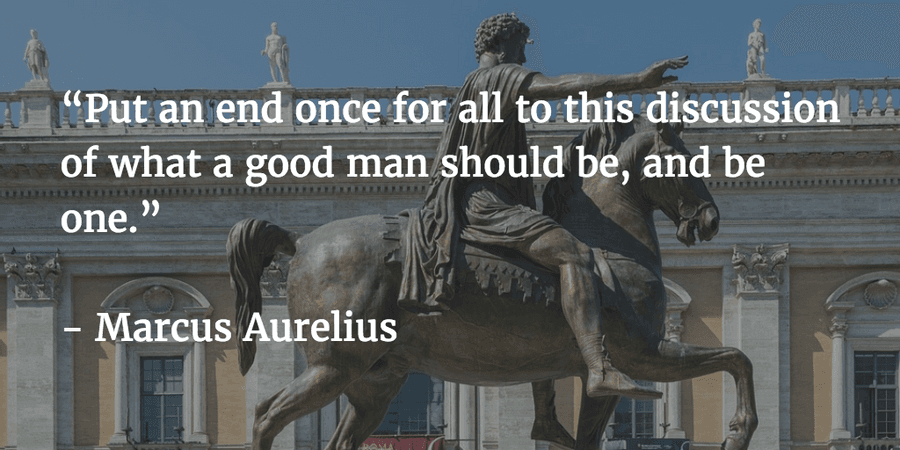Meditations Summary
Curated from: fourminutebooks.com
Ideas, facts & insights covering these topics:
15 ideas
·5.69K reads
37
1
Explore the World's Best Ideas
Join today and uncover 100+ curated journeys from 50+ topics. Unlock access to our mobile app with extensive features.
Meditations By Marcus Aurelius - Book Overview
Meditations by Roman emperor Marcus Aurelius was probably never meant to be published, but in 1558 someone at Heidelberg University in Germany decided that these 12 books full of wisdom were too valuable to remain hidden from the world – and printed them.
25
514 reads
Author Quote
"Put an end once for all to this discussion of what a good man should be, and be one."
-Marcus Aurelius
30
591 reads
Top 3 Book Lessons
- True “logic” doesn’t always make sense, but everything happens for a reason.
- Life is too short to complain.
- The only pain you suffer is the pain you create yourself.
Excited about stoicism? Let’s begin your training, young philosopher!
34
527 reads
Lesson 1: The true meaning of “logic” is not something that always needs to make sense — but it’ll always have purpose.
The word logic as we use it today originally stems from ancient Greek. The word “logos” means “reason” and to the stoics, it was the force of life.
Logos gives everything its form and its order. It flows through every plant, every tree, every building and every human being. It is the essence of all life and the underlying master plan for everything that happens in the world . Therefore, every single thing that happens, whether good or bad, happens for a reason.
26
417 reads
We’ve long deviated from this concept. To us, logic has become a much more mathematical concept.
1+1 = 2. That’s logic to us. But when a close family member unexpectedly dies , we don’t think that’s logical. It doesn’t make sense to us. It’s unfair, we get angry, we cry and resent the world.
Marcus Aurelius believed that everything happens for a reason. Always. Even in the worst of times, he took comfort in the fact that everything is exactly as it’s supposed to be.
28
355 reads
Lesson 2: Life is too short to waste even a second complaining.
If everything is exactly right the way it is, complaining becomes utterly useless then , doesn’t it?
There’s a saying I like:
“For every minute you are angry you lose sixty seconds of happiness.” ― Ralph Waldo Emerson
You could’ve spent those 60 seconds laughing. Talking. Breathing. Living. But you chose to complain to the person next to you in line at the cashier how hard life is. How much waiting at the grocery store sucks. And how stupid that employee is for making a mistake.
30
338 reads
You never know how long you have. No one knows. You could get hit by a bus tomorrow, or never even wake up the next day. Your time on earth is limited. Incredibly limited. So don’t waste it.
Marcus Aurelius hated holding court, but he knew he shouldn’t spend even a second regretting his duties. Instead, he trusted in the grand scheme of things, knowing that logos had a plan for him, and right now his part in that plan was to let people waste his time with superficial arguments and small talk in court.
25
294 reads
Lesson 3: The only pain you suffer is the one you inflict upon yourself.
Being an emperor in ancient Rome was a dangerous job. People tried to kill you, abduct you, stab you in the back and poison you at least once a week.
Marcus Aurelius believed that physical pain was part of logos’s big plan as well. He also suffered a lot of psychological pain in his lifetime. Out of his 13 children, 8 died before him, including his wife, who died at a very young age.
23
297 reads
But he was convinced that all these things happen for good reason, trusted in the purpose, and thus remained calm even in the worst of times. After all, these deaths were external events that Marcus Aurelius had no hand in whatsoever.
He believed that any harm done to a person from an external source was beyond their control and therefore, couldn’t truly harm them . The suffering only starts if you allow it to, because you start blaming yourself, questioning why things happen, or complaining about how unfair everything is.
26
285 reads
Meditations - BookReview
Wow. For some of you this might all feel very abstract, but I can’t remember the last time I learned so much from a summary that’s this short (just 5 blinks). For books like these a Blinkist summary is the perfect intro, because it describes everything in plain words. As you can imagine, the original text is quite complicated.
23
273 reads
Book Ava
Meditations is available for free online, but usually, professional translations by a publisher in paperback format will help you engage with the book more and digest its ideas better. I recommend the Dover Thrift Edition . I also tend to do better with heavier topics, like life, death, thinking, etc., when I have something in my hand that I can mark, leave comments on in pen, and so on. If you’re new to Stoicism, this book is a must-read.
23
245 reads
IDEAS CURATED BY
CURATOR'S NOTE
Meditations by Marcus Aurelius - Book Summary
“
Tom Joad's ideas are part of this journey:
Learn more about motivationandinspiration with this collection
Cultivating self-awareness and self-reflection
Prioritizing and setting boundaries for self-care
Practicing mindfulness and presence
Related collections
Similar ideas
2 ideas
Meditations of Marcus Aurelius
Marcus Aurelius
1 idea
Meditations
Marcus Aurelius
11 ideas
The Inner Citadel
Pierre Hadot, Mark Aurel (Römisches Reich, Kaiser), Emperor of Rome Marcus Aurelius
Read & Learn
20x Faster
without
deepstash
with
deepstash
with
deepstash
Personalized microlearning
—
100+ Learning Journeys
—
Access to 200,000+ ideas
—
Access to the mobile app
—
Unlimited idea saving
—
—
Unlimited history
—
—
Unlimited listening to ideas
—
—
Downloading & offline access
—
—
Supercharge your mind with one idea per day
Enter your email and spend 1 minute every day to learn something new.
I agree to receive email updates

